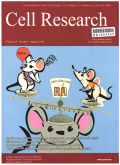- 钛学术文献服务平台 \
- 学术期刊 \
- 基础科学期刊 \
- 生物科学期刊 \
- 细胞研究(英文版)期刊 \
The oncogenomic function of androgen receptor in esophageal squamous cell carcinoma is directed by GATA3
The oncogenomic function of androgen receptor in esophageal squamous cell carcinoma is directed by GATA3
基本信息来源于合作网站,原文需代理用户跳转至来源网站获取
摘要:
Dear Editor,Esophageal carcinoma (EC) is the 6th leading cause of cancer death worldwide.In China,esophageal squamous cell carcinoma(ESCC) is the predominant histological subtype of EC and the 4th leading cause of death from cancer.1,2 While esophagectomy has been central to the standard of care for localized ESCC,relapse often occurs rapidly.For advanced ESCC,multimodality therapies incorporating systemic chemotherapies and/or radiotherapy have yielded limited clinical benefit.Despite extensive research efforts,no targeted therapies have yet been approved for the treatment of advanced ESCC.Interestingly,ESCC is strongly characterized by a male-predominant propensity,as both incidence and mortality rate are 2-3-fold higher in males than in females.1 Previous studies have revealed a possible association between androgen receptor(AR) signaling and male ESCC.3'4 AR is a ligand-dependent transcription factor that regulates target gene expression through binding to androgen-responsive elements (AREs) in the presence of androgens.Conversely,AR antagonists (e.g.,enzalutamide)compete with androgens to bind AR and inhibit its binding to AREs.5,6 To date,while the genomic function of AR has been extensively studied in prostate cancer,5,7,8 it remains unknown how AR exerts its oncogenic functions in ESCC at a genome-wide scale.Addressing this question is of high clinical relevance as it willestablish a mechanistic basis for a promising therapeutic strategy tarqetinq the AR transcription axis for ESCC patients.

推荐文章
GATA3在乳腺癌组织中的表达及其临床意义
乳腺癌
GATA3转录因子
分子分型
T-bet/GATA3与疾病
转录因子
T-bet
GATA3
疾病
乳腺肿瘤组织中GATA3的表达及临床意义
乳腺肿瘤
GATA3
表达
临床意义
滋养组织中转录因子GATA3的表达及意义
滋养细胞疾病
GATA3
免疫组织化学
诊断
内容分析
关键词云
关键词热度
相关文献总数
(/次)
(/年)
引文网络
引文网络
二级参考文献 (0)
共引文献 (0)
参考文献 (2)
节点文献
引证文献 (0)
同被引文献 (0)
二级引证文献 (0)
2005(1)
- 参考文献(1)
- 二级参考文献(0)
2010(1)
- 参考文献(1)
- 二级参考文献(0)
2021(0)
- 参考文献(0)
- 二级参考文献(0)
- 引证文献(0)
- 二级引证文献(0)
引文网络交叉学科
相关学者/机构
期刊影响力
细胞研究(英文版)
主办单位:
中国科学院上海生化细胞所
出版周期:
月刊
ISSN:
1001-0602
CN:
31-1568/Q
开本:
16开
出版地:
上海岳阳路319号中科院上海生命科学研究院31B,401室
邮发代号:
4-645
创刊时间:
1990
语种:
eng
出版文献量(篇)
2692
总下载数(次)
0
总被引数(次)
40708
期刊文献
相关文献
推荐文献
- 期刊分类
- 期刊(年)
- 期刊(期)
- 期刊推荐
力学
化学
地球物理学
地质学
基础科学综合
大学学报
天文学
天文学、地球科学
数学
气象学
海洋学
物理学
生物学
生物科学
自然地理学和测绘学
自然科学总论
自然科学理论与方法
资源科学
非线性科学与系统科学
细胞研究(英文版)2022
细胞研究(英文版)2021
细胞研究(英文版)2020
细胞研究(英文版)2019
细胞研究(英文版)2018
细胞研究(英文版)2017
细胞研究(英文版)2016
细胞研究(英文版)2015
细胞研究(英文版)2014
细胞研究(英文版)2013
细胞研究(英文版)2012
细胞研究(英文版)2011
细胞研究(英文版)2010
细胞研究(英文版)2009
细胞研究(英文版)2008
细胞研究(英文版)2007
细胞研究(英文版)2006
细胞研究(英文版)2005
细胞研究(英文版)2004
细胞研究(英文版)2003
细胞研究(英文版)2002
细胞研究(英文版)2001
细胞研究(英文版)2000
细胞研究(英文版)2021年第9期
细胞研究(英文版)2021年第8期
细胞研究(英文版)2021年第7期
细胞研究(英文版)2021年第6期
细胞研究(英文版)2021年第5期
细胞研究(英文版)2021年第4期
细胞研究(英文版)2021年第3期
细胞研究(英文版)2021年第2期
细胞研究(英文版)2021年第12期
细胞研究(英文版)2021年第11期
细胞研究(英文版)2021年第1期

 免费查重
免费查重










